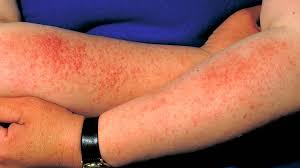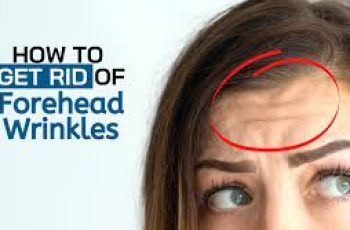
What Causes Sun Sensitivity or a Sun Allergy?
Allergy To Sun
Are you suddenly allergic to the sun? You may be putting something on your skin or taking a drug that made you get a “sun allergy”.
There are many things that can cause your skin to suddenly become sensitive to sun.
A sun allergy increases your changes of sun burn and sun damage to your skin.
Sun sensitivity results in sunburn and hyperpigmentationand speeds skin agingso you need to know what is causing your sun sensitivity.
Find a list of medications that make you sensitive to sun in alphabetical order at the end of this sun allergy blog.
Allergic Reaction To the Sun
Photoallergy is a type of skin reaction that occurs when certain chemicals applied to the skin interact with ultraviolet (UV) radiation from sunlight. It is an allergic response that develops over time and involves the body’s immune system. When the skin is exposed to a combination of certain substances (such as certain medications, skin care products, fragrances, or sunscreen ingredients) and UV light, it can lead to a photoallergic reaction.
UV radiation is capable of altering the chemical structure of these substances, turning them into something the immune system recognizes as foreign or potentially harmful, also known as an allergen. This process is known as photoactivation. Once these photoactivated substances are formed, they can bind to skin proteins, prompting the immune system to react. This response can lead to symptoms like redness, itching, and inflammation on areas of the skin exposed to the sun. Importantly, these symptoms may not show up until one to two days after the exposure and can spread to areas not directly exposed to the sun. Because of the immune system involvement, once a photoallergy develops to a certain substance, future exposure to that substance (in the presence of UV light) can trigger the same allergic reaction.
Signs Symptoms of Sun Sensitivity
The symptoms of sun sensitivity occur in areas of sun exposure and are:
redness
hives
blisters
tanning
hyperpigmentation
If these are caused by skin care products, you will see these symptom only in areas that ahve been exposed to both:
sun
skin care product
What skin care ingredients are photoallergens?
Some skin care ingredients can cause an allergy such as redness and hives when exposed to sun. These are called photoallergens.
Photoallergens can be used without any problems on the skin until you go in the sun. Once you wear them in the sun, they can cause a skin allergy in susceptible people.
Sunscreens cause an allergic reaction when you go in the sun:
Avobenzone (Parsol)
Benzophenone
Benzophenone-3
Benzophenone-4
Ensulizole
Octinoxate
Octocrylene
Fragrances that are known photoallergens are:
Balsam of Peru
Bergamot Oil
Citronellol
Citrus Aurantium Bergamia (Bergamot Orange) Oil
Citrus Aurantium Dulcis (Orange) Extract
Citrus Nobilis (Mandarin Orange) Peel Oil
Coumarin
Hydroxyisohexyl 3-Cyclohexene Carboxaldehyde
Isoeugenol
Musk Ambrette
Musk ambrette
Musk tibetene
Nitromusks
Oils that are photoallergens:
Arachis Hypogaea (Peanut) Oil
Hydrogenated Peanut Oil
Oil of Bergamot
Photosensitivity
Lorem ipsum dolor sit amet consectetur adipisicing elit. Illum neque eaque, autem sit soluta, voluptatum libero magnam tempore ullam at harum vel, ad reprehenderit, nemo veniam quas in voluptas hic. Lorem ipsum dolor, sit amet consectetur adipisicing elit. Natus id officia omnis suscipit aut architecto repellat a quia eaque reiciendis blanditiis perferendis hic, nihil, mollitia. Iste velit aperiam, numquam dolorem.
Phototoxicity
A phototoxic reaction, similar to a photoallergic reaction, is a type of skin reaction that occurs when certain substances on the skin interact with ultraviolet (UV) radiation. However, the mechanisms and symptoms of phototoxic reactions are different from those of photoallergic reactions because they are not caused by the part of the immune system that medicates allergy such as IgE antibodies.
In a phototoxic reaction, certain chemicals applied to the skin, when exposed to UV light, become activated and can directly damage surrounding skin cells.
Phototoxic reactions can occur in anyone exposed to the reactive substance and sufficient UV light, regardless of previous exposure, immune status, or history of allergies.
The symptoms of a phototoxic reaction usually develop within hours of UV exposure and closely resemble an extreme sunburn. This may include redness, pain, swelling, and blistering on the areas of skin exposed to the sun. The symptoms of a phototoxic reaction are typically confined to the areas directly exposed to the sunlight and don’t spread to shaded areas.
Which medications increase sun sensitivity and make you more likely to sunburn?
These medications, when taken by mouth, make you sun sensitive.
Make sure you avoid sun and wear SPF when you are taking these medications.
Medications used to make the skin more sensitive to ultraviolet light to treat diseases like psoriasis and vitiligo:
methoxsalen
psoralens
trioxsalen
Acne medications:
accutane
bactrim
doxycycline
isotretinoin
tetracycline
trimethoprim
Antibiotics:
ciprofloxacin (Cipro)
doxycycline
levofloxacin
ofloxacin
tetracycline
trimethoprim
Antifungal medications:
These antifungal medications make your skin more likely to sunburn:
flucytosine
griseofulvin
voricanozole
Antihistamines:
cetirizine
diphenhydramine
loratadine
promethazine
cyproheptadine
Blood pressure and heart medications:
ACE inhibitors
Amiodarone
Calcium channel blockers
Diltiazem
Enalapril
Nifedipine
Quinidine
Valsartan
Cholesterol lowering drugs (statins):
atorvastatin
lovastatin
pravastatin
simvastatin
Diabetes medications:
glipizide (Glucotrol)
glyburide
Diuretics:
chlorothiazide
chlorthalidone
furosemide (Lasix)
hydrochlorothiazide
triamterene
Psychiatry drugs:
haloperidol
olanzapine
quetiapine
risperidone
Antidepressants:
amitriptyline
doxepin
imipramine
nortriptyline
Hormones:
estrogen
Non steroidal anti-inflammatory drugs (NSAIDS):
celecoxib
Ibuprofen (Advil)
ketoprofen
naproxen
piroxicam (Feldene)
Sulfonamides:
acetazolamide,
sulfadiazine
sulfamethizole
sulfamethoxazole
sulfapyridine
sulfasalazine
sulfasoxazole
undefined
List of medications that make you more likely to sunburn in alphabetical order:
Accutane
ACE inhibitors
acetazolamide,
Amiodarone
amitriptyline
atorvastatin
bactrim
Calcium channel blockers
celecoxib
cetirizine
chlorothiazide
chlorthalidone
ciprofloxacin (Cipro)
cyproheptadine
Diltiazem
diphenhydramine
doxepin
doxycycline
doxycycline
Enalapril
estrogen
flucytosine
furosemide (Lasix)
glipizide (Glucotrol)
glyburide
griseofulvin
haloperidol
hydrochlorothiazide
Ibuprofen (Advil)
imipramine
isotretinoin
ketoprofen
levofloxacin
loratadine
lovastatin
methoxsalen
naproxen
Nifedipine
nortriptyline
ofloxacin
olanzapine
piroxicam (Feldene)
pravastatin
promethazine
psoralens
quetiapine
Quinidine
risperidone
simvastatin
sulfadiazine
sulfamethizole
sulfamethoxazole
sulfapyridine
sulfasalazine
sulfasoxazole
tetracycline
tetracycline
triamterene
trimethoprim
trimethoprim
trioxsalen
Valsartan
Voricanozole
Do topical retinoids give you sun sensitivity?
There is a myth that retinoids make you very susn sensitvie. You can read more about retinol, tretinoin and other topical retinols and how they react in the sun in the blog.
What vitamins cause sun sensitivity?
A deficiency of niacin causes a disease pellagra that causes sun sensitivity. There are no vitamins that i know of that increase sun sensitivity. Polypodium leukotomas and antioxidants will decrease sun sensitivity.
Foods that cause phytophotodermatitis
When you have juice or residue from these foods on your hands and touch your skin, you make your skin more sun sensitive in the areas you touch. This is very common and is called phytophotodermatitis or “rash that occurs when plants touch the skin and skin is exposed to sun”.
Foods that make skin burn in the sun causing hyperpigmentation are:
carrots
celery
dill
figs
limes
parsley
If you suffer from hyperpigmentation only on the face or sun exposed areas, it is possible that one of these sun sensitizers is causing the hyperpigmentation.


